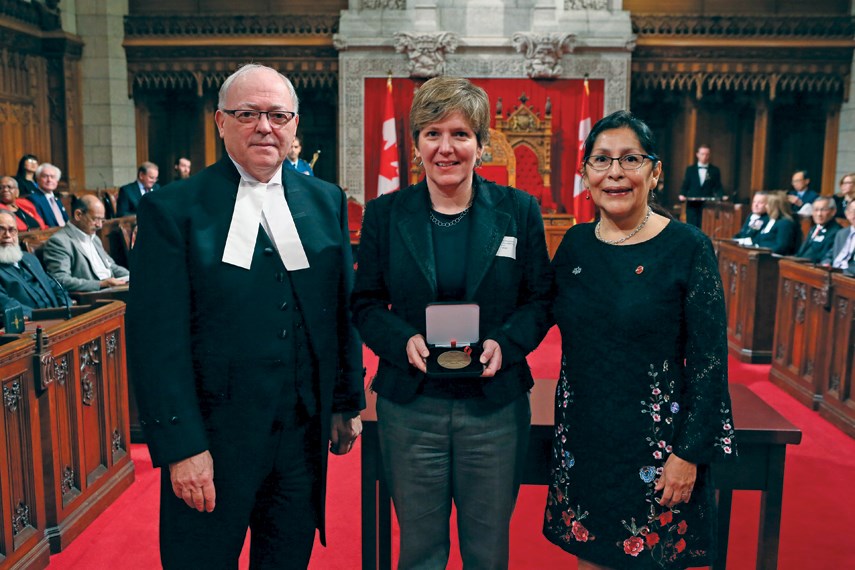A North Vancouver woman who has spent her career involved in the scientific field of genomics and genetics has been recognized for her significant contributions.
Dr. Catalina Lopez-Correa, who currently serves as chief scientific officer and is a vice president at the non-profit research organization Genome BC, received a commemorative Canada 150 medal from the Canadian Senate Nov. 29 in a ceremony in Ottawa.
The Senate 150 Medals, which have been awarded by senators to Canadians whose generosity, dedication, volunteerism and hard work make their communities a better place, are meant to commemorate the 150th anniversary of the Senate of Canada’s first sitting on Nov. 6, 1867.
They feature the Senate’s emblem on one side and the Senate chamber, along with the recipient’s name, on the other.
For Lopez-Correa, who came to Canada from Colombia in 2008 and became a Canadian citizen in 2014, it was an honour.
“For me, it’s a very nice recognition of that hard work and most importantly is that these medals recognize the Canadian values of hard work, generosity, voluntary work, and really making Canada a better place to live.
“I share those values too. I have received recognitions for my scientific work, for leadership, and all that, but this really gets into my heart because it’s more the core values that I also share,” she said.
Lopez-Correa described genomics as referring to the entire human genome – the entire DNA of a living organism – as opposed to genetics, which might focus on just one gene. Like genomics itself, her contributions to the field are far-reaching.
While she has an extensive background in research, her primary role now at Genome BC is as an science administrator and advocate, she said,
“We are a funding agency so what we do is to support projects in that field,” she said. “We are working with scientists at UBC, scientists at UVIC, SFU – really around the province – and we are supporting them in their work.”
According to Genome BC’s website, the organization works collaboratively with government, academia and industry in order to advocate for applications, such as grants, to go through that will ultimately generate social and economic benefits in the fields of health, forestry, the environment, and more.
All projects are heavily peer reviewed before Genome BC assists in preparing an application to ensure the initiative gets off the ground, Lopez-Correa explained.
“One example of a project in human health we have is the personalized oncogenomics initative, where people with severe metastatic cancer get their genome sequenced,” she said. “Based on that information we can provide a much more personalized treatment to the patient. It’s really using genomics for precision medicine.”
Lopez-Correa completed medical school in 1991. She worked as a doctor for a few years, but said she always knew her passion was in research, not clinical practice.
She said she was drawn specifically to the field of genomics and genetics because it provides the answers at the core of what it is to be human, at least on a physical scale.
“We say lung tumour, lung cancer, but all the lung cancers are not exactly the same, and individuals don’t have the same profile and don’t respond to the same drugs in the same way,” she explained. “When you look at the DNA and genomic profiling, you are able then to make a much more refined diagnosis and you’re able also to provide a personalized treatment for that person.”
Prior to joining Genome BC, Lopez-Correa was instrumental at Genome Quebec, and also held senior research positions with pharmaceutical company Eli Lilly and the deCODE genetics lab in Iceland.
Her research work there included leading teams in therapeutic areas of oncology, cardio-metabolic and neurosciences, among numerous other projects.
She said her hope is that genomics and human genome projects could become more mainstream.
Specifically, she brought up the idea of a patient having their genetics tested when they went to the doctor, a process that could help let a person know if they were susceptible to certain illnesses or predisposed to other afflictions.
That way a person could deal with their health before it became an issue.
“It would be in your genome and as soon as you’re born you get your card and then off you go to live your life, knowing what your body’s telling you,” she said.



